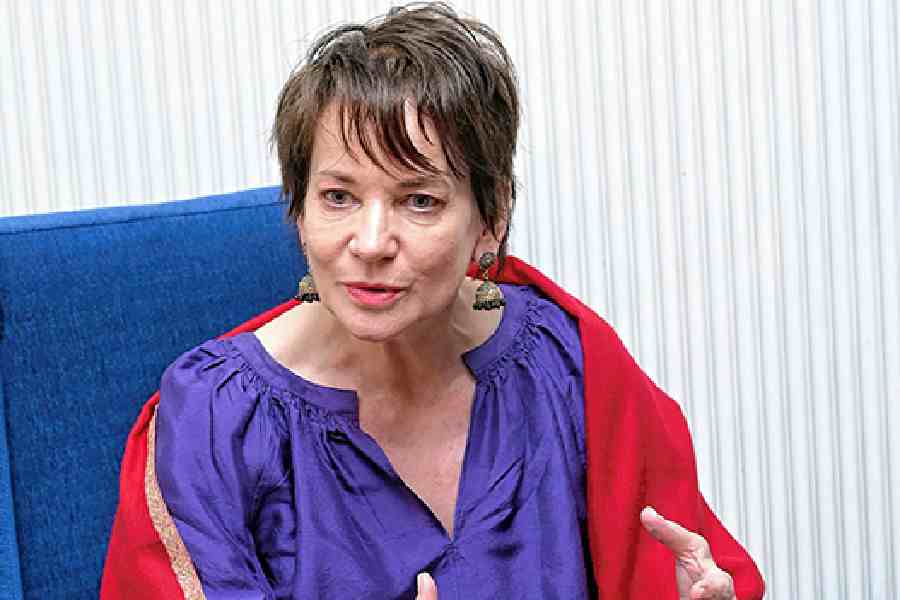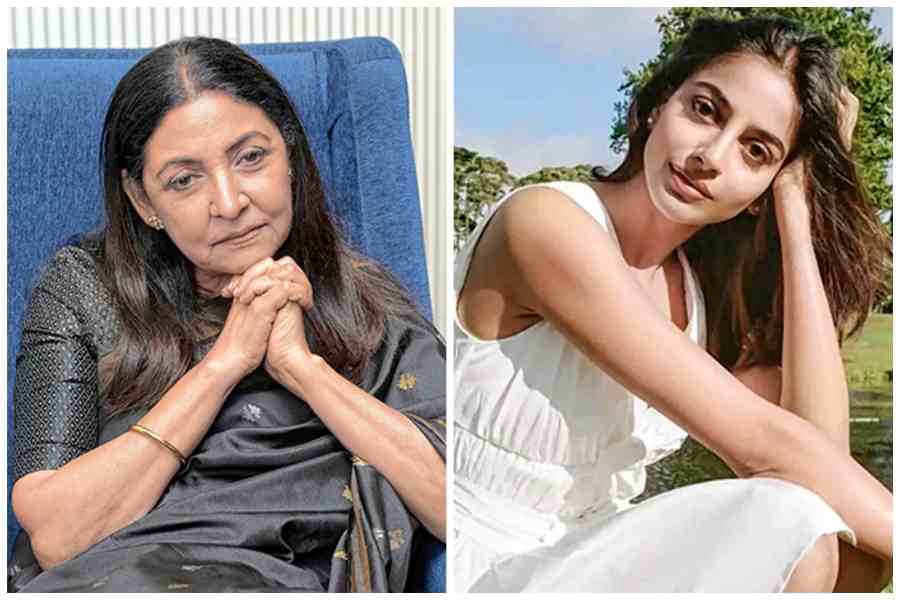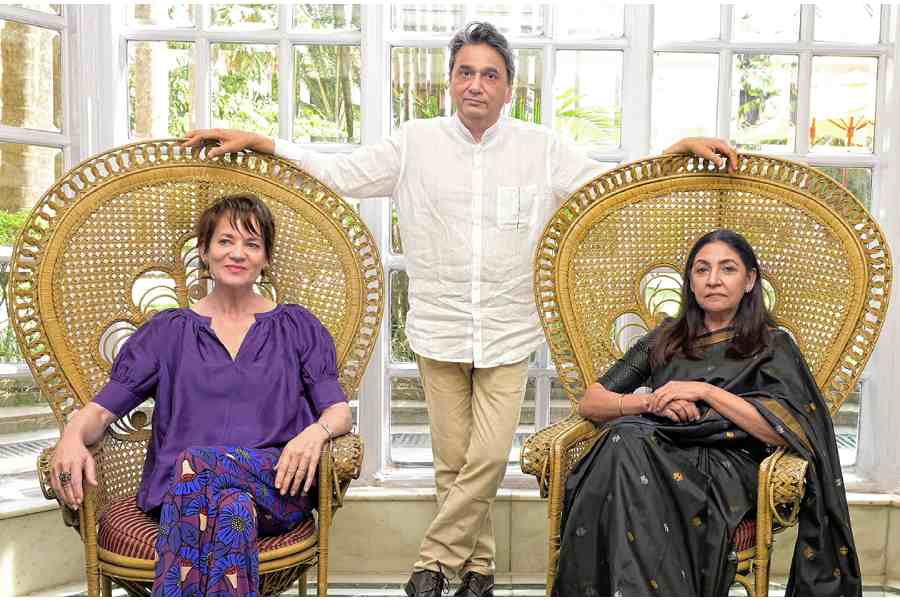It describes itself as ‘a story about love and compassion inspired by the life of Mother Teresa’. Mother Teresa & Me is an attempt to humanise Mother Teresa, the benefactor of the poor, and look at her as the person behind the saint. Directed by Kamal Musale, the film — which was shot in Kolkata during peak Covid — has Swiss actress Jacqueline Fritschi-Cornaz playing Mother Teresa, with Deepti Naval and Banita Sandhu, among others, being part of the cast.
Recently, Kamal Musale, Jacqueline Fritschi-Cornaz and Deepti Naval were in town to talk about their film, which releases in theatres today. The Telegraph caught up with the trio for a chat.
Kamal, what was the starting point of the film?
Kamal Musale: It was actually Jacqueline (Fritschi-Cornaz, who plays Mother Teresa) who thought of the idea. I was approached by the foundation that they have in Switzerland for financing this movie and they asked me if I was interested to write, and I was definitely interested because I had been filming on different continents and had often seen poor people, dying people, people in need and this was an emotion that I was always carrying with me. This film, I felt, was a very good vehicle to convey these emotions.
So I started to write the story, and at the same time, I was grappling with what had been widely reported as Mother Teresa’s loss of faith. But the more I worked on the story and the character, I realised who she was really and how she was very far from the idea that most people have about her... the fact that she had a crisis of faith and she had written letters about her doubts, which had been published after her death.
But I had to acknowledge this possible feeling of abandonment that she had probably gone through in life. And so, I thought of creating the character of a young British woman of Indian descent (played by Banita Sandhu), a woman of today, who goes through a lot of questions and problems herself, which she has to solve. And with the common feeling of abandonment, I could link both my stories.
Jacqueline, of course, came up with the idea. What made you zero in on the rest of the cast?
Kamal: Well, destiny has been very kind to me and brought me Deepti Naval, a perfect gift for this film. She plays a fundamental role in creating the love that links the two stories and makes us understand the different layers of the film... of courage, hope, difficulty, pain....
Jacqueline, of course, had a very, very difficult part to play. When she started working on the film, she worked very much like a method actor. She put herself into the role very physically. She had belief from the beginning to the end and created a very strong conviction about this character in everyone.

Jacqueline Fritschi-Cornaz

(L-R) Deepti Naval, Banita Sandhu stars as Kavita in the film
Jacqueline, this is not an easy person to inhabit. What were the biggest challenges of playing Mother Teresa? I believe you spent time with the sisters of Missionaries of Charity in Calcutta before the shoot...
Jacqueline Fritschi-Cornaz: It was an incredible pleasure to work with Kamal as director and it was wonderful to discuss which aspects of Mother Teresa we really wanted to express in this movie. And for us, it was important to really show her as a human being, all her feelings and emotions.
It was a challenge but also a great journey to dive in and to work with all the layers physically, but also with the language, and the Albanian accent. And yes, I went to work with the association (Missionaries of Charity) to understand their dedication.
I was in Scotland visiting her family and I received this wonderful cross from them that I wore during the shooting. I also spent time in a monastery in Switzerland to understand that kind of life better. I am also happy to have been able to work in India, especially in Calcutta. Yes, the City of Joy (smiles). And I am so happy to be here again.
Deepti ma’am, what was your experience of playing this character?
Deepti Naval: : The first and most important reason was I liked the idea of the film and then I read the script and I was very impressed by the script. I thought it would be really nice to be part of cinema like this. Rather than doing the expected kind of roles, you know.
The script kept changing while working on it, but the whole concept was wonderful. The parallel track between Mother Teresa and Kavita (Banita’s character), who is generations younger... it was a very interesting way of looking at Mother Teresa’s conflict.
Inhabiting this part was simple. Nothing. No homework, nothing (smiles). I just played her by tapping into the years of experience I have. There are many parts of us actors as people that get consumed in one role or another. You bring out something in this role, something else in another role, something else of you in a third role. That happens all the time.
What was your idea of Mother Teresa before this and how did it change once you made the film?
Kamal: : We all know of her but we don’t know her. It’s not like I had a concept of Mother Teresa. I approached her like a person who perhaps had some inner doubts, but she never shared them openly. She only shared and solved the problems of others. For me, that dichotomy made her an interesting character.
Jacqueline: I read some very touching letters of hers that were published in 2007 and those helped me discover her in some ways. She was incredibly lonely, and as an actor, that was a complex journey for me to go on. I needed some time to get there but it was worth it because I then really, really got into all these energies and it helped me to transform physically... with the voice, with all these different aspects. And I also discovered her vulnerability.
Our film humanises her and it’s possible for the audience to identify with her instead of just looking at her as a saint. I feel this film and how we have shown her may inspire a lot of people around the world to live with more compassion, to have their own vision and to stick with it, even in times of trouble and doubt.
Deepti: The early impression of Mother Teresa was, of course, of being this unbelievably selfless person who had devoted her life to helping the poor, the people who are deprived. And then, in recent years, one has heard some controversial things. And one was never kind of inclined to believe that but the film brings in a very interesting perspective and explores the woman that is behind the image. It was interesting for me to see how Kamal and Jacqueline had worked around those aspects of Mother Teresa, which are so real, so palpable, so identifiable....
But, of course, her goals were much larger and her grit to stick to what she wanted to do with her life, her calling in this lifetime... that was very interesting. To see her go on with that despite the confusion and the questioning makes her human and not always this otherworldly figure.
Jacqueline, I saw this video of yours speaking a bit of Bangla while shooting this film. Are you good with picking up languages?
Jacqueline: I love languages! In Switzerland, we have the advantage that we already have four languages. I love music and I love listening to languages. Bengali was difficult for me, actually, because it’s not related to any other language I know, but it was wonderful to learn it. I love how it sounds.
What was it like shooting the film here during the peak Covid period?
Kamal: Covid was a challenge, but the bigger challenge was to work with the union here. The union of technicians in Calcutta is not really welcoming. Covid was a problem everywhere we were shooting. But that’s something you manage and arrange. Otherwise, this is a great city, people are very interested in cinema and culture.
Deepti ma’am, what kind of roles are you looking to do now?
Deepti: I have been getting a lot of offers. But I am always waiting to do something which has more heart, more challenge... something dynamic like the negative role I played in NH10.
I have reached a stage where I am not keen to be with make-up on and be in the studio all the time. I want to go slower, I want to wait for roles that inspire me.










